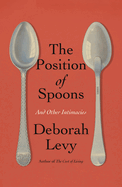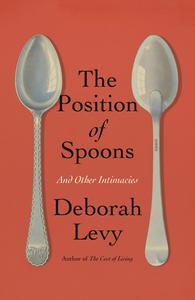
 British playwright, poet, and author Deborah Levy shares illuminating glimpses into her writing life and engages readers on topics as varied as French writers, automobiles, and wisteria plants in The Position of Spoons and Other Intimacies. Elevated by Levy's sharp eye and her wry, humorous observations, readers will experience through her words the sensation of "rat-grey" London skies and the "fresh and full aroma" of female hysteria lingering across generations of trauma.
British playwright, poet, and author Deborah Levy shares illuminating glimpses into her writing life and engages readers on topics as varied as French writers, automobiles, and wisteria plants in The Position of Spoons and Other Intimacies. Elevated by Levy's sharp eye and her wry, humorous observations, readers will experience through her words the sensation of "rat-grey" London skies and the "fresh and full aroma" of female hysteria lingering across generations of trauma.
Within this marvelous montage of essays and vignettes exploring the emotional and intellectual contours of her interior world, Levy's opening essay pays homage to literary hero Colette. Colette's "self-possessed" beauty and "transgressive and sensuous" style resonated with a teenage Levy, who was also preoccupied with "the theatre of inventing herself." In this she was assisted by a pair of much beloved "brothel creepers," shoes that elevated her confidence and "put the world in perspective."
The Position of Spoons collects previously published pieces and a handful of original compositions. It is in part a manifesto on the profound influence of brilliant women who jolted the author's sensibilities through their work, including the way the courageous model-turned-combat journalist Lee Miller "pointed her camera at terrible things." Levy singles out those who have unapologetically pushed boundaries, admiring the beguiling paintings of Portuguese figurative artist Paula Rego and how her art "dismantles the patriarchal story that has flattened girls and women everywhere."
Levy (The Man Who Saw Everything; Swimming Home; Hot Milk) navigates intense personal moments of lightness, joy, and despair, including, in the essay "A Roaming Alphabet for the Inner Voice," the devastating moment she knew the "crashed aeroplane" of her marriage had sputtered out. Also alphabet-themed, "A to Z of the Death Drive" remembers celebrities who lost their lives in car accidents, among them Eddie Cochran, James Dean, Grace Kelly, and Jackson Pollock. God, she dryly notes, is our "global positioning system."
A trove of memories tumbles forth in the title essay, in which a 26-year-old Levy ponders the difference between a voyeur and a spy. Reading from this collection of 34 pieces, one is privy to some of the author's most heartfelt reflections. Ultimately, The Position of Spoons is a celebration of the freedom to write, the freedom to create and flourish. As Levy reminds us, "No one will give you freedom/ You have to take it." --Shahina Piyarali
Shelf Talker: This marvelous montage of essays and vignettes offers glimpses into the author's writing life and her engaging observations on French writers, automobiles, and female hysteria, among other topics.

